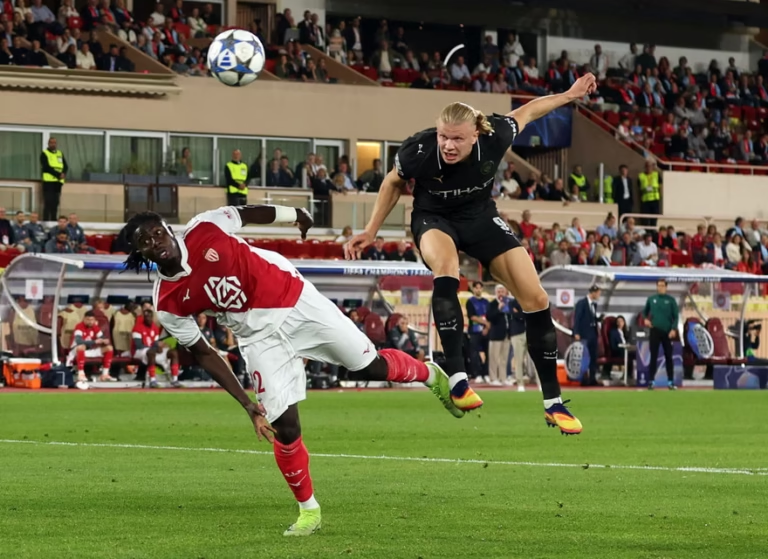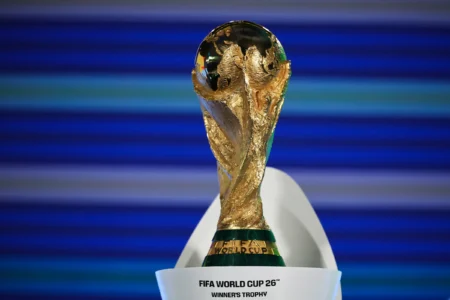Manchester City appeared on course for a comfortable win at the Stade Louis II, only for Monaco to snatch a late draw with a penalty from Eric Dier. The match ended in chaos after Nico González fouled Dier in a misjudged attempt to defend a free-kick, leaving City frustrated and their perfect Champions League start undone.
Erling Haaland had given City an early advantage, scoring twice to raise his tally to 11 goals in eight games. His clinical finishing highlighted his continued dominance, but defensive lapses allowed Monaco to fight back. First, Jordan Teze was left with too much space at the edge of the box, curling the ball into the top corner to level the score. Moments later, González’s high-leg challenge on Dier resulted in the penalty, which Dier calmly converted in the final minute.
The match featured multiple incidents that tested City’s composure. Gianluigi Donnarumma had to intervene while the referee, Jesús Gil Manzano, consulted the pitchside monitor. Players and staff from both teams crowded around, delaying the decision, but Dier remained composed and ensured Monaco claimed a crucial point.
City dominated possession, controlling nearly three-quarters of the ball and taking 18 shots, six of which were on target. Despite their control, Monaco’s disciplined low block and careful defensive positioning limited City’s opportunities for a third goal. The hosts remained compact and focused, forcing City to work hard for every chance.
The first goal arrived through Haaland, who benefited from Josko Gvardiol’s precise ball over the Monaco defence. The Norwegian striker flicked the ball past onrushing goalkeeper Philipp Köhn with his first touch, demonstrating his strength and timing. City’s attacks were then repeatedly stifled by Monaco’s structured defence, while City’s midfield occasionally failed to maintain pressure, allowing counterattacks.
Balogun and Teze provided Monaco with key chances to score. Balogun missed a header early on, while Teze’s strike shortly after City’s opener leveled the score. The visitors had to reorganize after Vanderson left the field injured, and City’s attacks occasionally threatened to break the deadlock again. Tijjani Reijnders and Bernardo Silva created opportunities, while Phil Foden hit the crossbar, but Monaco’s goal remained intact until the late drama.
Haaland added his second with a precise header from a Nico O’Reilly cross, giving City the lead again. His performance reinforced his status as one of the competition’s most reliable scorers, bringing his Champions League record to 52 goals in 50 matches. His physical presence and ability to find space proved decisive, but City’s defensive lapses kept Monaco in the game.
Monaco’s chances continued late into the match. Balogun, Diatta, and Maghnes Akliouche tested Donnarumma with dangerous opportunities, but City’s goalkeeper responded well. Despite City’s control, Monaco remained patient, waiting for a mistake that finally came in stoppage time with González’s foul.
The final whistle confirmed a 2-2 draw, leaving City to reflect on missed chances and defensive errors. Monaco earned a point thanks to resilience, disciplined defending, and Dier’s composed finish from the penalty spot. The result highlighted the fine margins in the Champions League and left City with work to do as the group stage continues.
While Haaland’s brilliance provided moments of quality, Monaco’s opportunism and defensive organization earned them a share of the spoils. The match underlined that even dominant teams must maintain concentration until the final whistle, as lapses in judgement and discipline can prove costly.
The draw keeps City in contention but serves as a warning that no lead is safe, even against teams missing key players. Monaco, on the other hand, demonstrated the value of composure, tactical discipline, and readiness to capitalize on rare opportunities, showing that late interventions can change the course of high-stakes matches.







